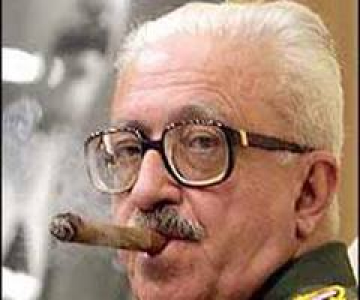What’s the true nature of Tareq Aziz’s relationship with Saddam?
Abdulrahman al-Rashed/Al Arabiya
Sunday, 7 June 2015
Some have claimed that former Iraqi president Saddam Hussein was a mere tool in the hands of his sly foreign minister Tareq Aziz. While others confirmed that Aziz was a mere employee in the court of a president who suffered from paranoia and treated his ministers like servants.The fact that Aziz, an intellectual who held a degree in English literature, worked with an uncultured and lowly officer like Saddam for a quarter of a century filled with tumultuous events remains an intriguing mystery. Saddam has been well-known as a world leader who committed stupid mistakes, mostly in relation to Iraq’s foreign policy. So what was the role of Tareq Aziz, Saddam’s comrade in the Baath Party, his friend, foreign minister and deputy premier?
Tareq Aziz died after a terrible prison ordeal. There have been several mediation attempts to release him and despite the conviction of many including his rivals that Aziz deserves compassion in his elderly years, Iraqi grudges led to the mystery man’s demise. It’s been said that Aziz spoke at length to American investigators while in prison and it is believed they compiled a wealth of unpublished information that can demystify the old iron regime. The information can also help up us understand modern history and can serve as a sermon and testament of our own collective history. Aziz had also spoken to the incumbent Iraqi government’s investigators. One of those he spoke to was Ali al-Dabbagah, a former Iraqi government spokesman. The latter’s meeting with Aziz was documented via a television interview however it did not provide solid details regarding past events as Aziz had suffered from a stroke while in prison and therefore was not in good health to speak at length.
Vindication and mystery
Supporters of late dictator Saddam Hussein have always made effort to vindicate him. One of the most common arguments is that Saddam was tricked by the U.S. to attack Iran and that then-American ambassador to Iraq April Glaspie lured him into invading Kuwait. Anyone who has studied history can figure that Saddam was an arbitrary leader and an authoritarian ruler. No one regardless of their status or position would dare oppose him. This is what made the role of former minister, Aziz, mysterious as no accusations were ever leveled at him, unlike many of his comrades who were sent to the gallows where Saddam had no quip ending the lives of his top aides and closest confidants. So then, was Aziz a cautious man who took into consideration the president’s paranoia and only fed his sense of greatness by telling him what he wants to hear? Or did Saddam exonerate Aziz and trusted his wisdom and loyalty as evident by entrusting Aziz with sensitive and dangerous issues?
Aziz is now gone and the world will not know the complete truth unless classified documents are made public or surface somehow
Saddam’s decision to engage in a war with Iran cannot be supported or advocated by a foreign affairs minister who is aware of the graveness of shifting geopolitics and who realizes that Iraq is militarily weaker and has a third of Iran’s population. Above all, Aziz was well-aware of the threats posed from involvement in the-then Cold War disputes. It is also impossible that Aziz did not know that the most dangerous move was Saddam’s invasion of Kuwait, the world’s third largest oil producer and whose instability threatens the security of the Gulf countries who fall under Western nation’s sphere of protection.
Aziz’s case thus remained a mystery bewildering many. Aziz was an intellectual and knowledgeable man who travelled the world. He was more knowledgeable than his ignorant president, Saddam, who had a little formal education and who understood little about the world outside of Iraq other than the apartment he resided at in Cairo. Aziz’s body language contradicted his statements. When Saddam obliged him to wear a military uniform, he appeared on television while holding a fancy Cuban cigar while talking about the suffering of the Iraqi people as a result of economic sanctions. Aziz’s speech was not convincing although it was impassioned.
Aziz is now gone and the world will not know the complete truth unless classified documents are made public or surface somehow. Aziz was the black sheep in Saddam’s flock and neither supported him nor could openly oppose him. He is reminiscent of current Syrian foreign minister Walid al-Mouallem in terms of his apparent intellect and position as well as misfortune that his president, Bashar al-Assad, loves him and thinks he’s important to the point of not allowing him to leave his side.





















